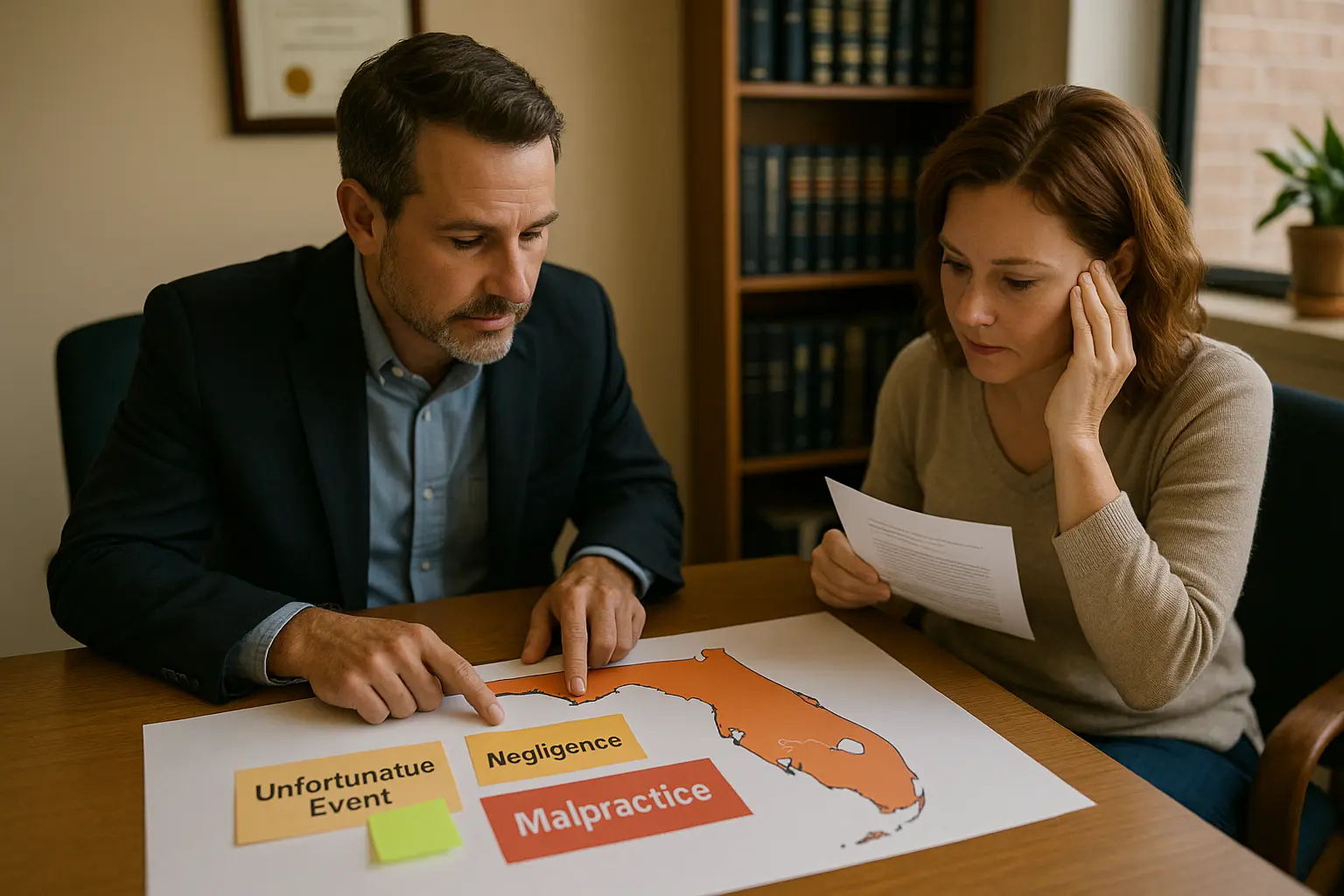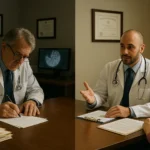Índice
Cuando un procedimiento sale mal: ¿error, negligencia o simplemente mala suerte?
Un resultado aplastante hace que las familias se pregunten si el daño se debió a un riesgo médico inevitable, a un descuido que podría cometer cualquier profano o a la actuación de un profesional. negligencia profesional regida por la Ley de Florida § 766. La ley responde examinando lo que un proveedor razonablemente prudente debería haber hecho en la misma situación; si ningún proveedor podría haberlo evitado, el suceso es "desafortunado" y no indemnizable. Percy Martínez comienza cada auditoría gratuita reconstruyendo ese momento contra las directrices clínicas del mundo real y los datos estatales de incidentes adversos registrados con AHCA, enmarcando su experiencia en el lenguaje que los tribunales y las aseguradoras respetan.
La línea clara de Florida: negligencia médica frente a negligencia ordinaria
La mala praxis es una negligencia profesional: un error de un profesional sanitario autorizado que se desvía de la norma profesional de atención prevalente, mientras que la negligencia ordinaria cubre a los actores no médicos o las tareas que no requieren juicio clínico. Una enfermera que tropieza con unos cables sueltos puede dar lugar a una demanda por negligencia en las instalaciones; la misma enfermera que dosifica mal la insulina invoca la negligencia profesional. Por qué es importante: las demandas por negligencia deben seguir las normas del capítulo 766 sobre notificación previa a la demanda, declaración jurada de expertos y estatuto de dos años, mientras que los casos de negligencia ordinaria se acogen al plazo civil de cuatro años y omiten las costosas declaraciones juradas.
La prueba de los cuatro elementos que todo jurado de Florida escucha
Si está etiquetado negligencia o mala praxisSin embargo, hay que probar la obligación, el incumplimiento, la causalidad y los daños. Percy Martinez obtiene dictámenes jurados de especialistas titulados en un plazo de treinta días, cumpliendo el umbral de "buena fe" del capítulo 766.203, y a continuación superpone esas conclusiones con las taxonomías de errores de la OMS que distinguen los acontecimientos adversos evitables de las complicaciones sistémicas. Esta doble lente convence a los peritos y, si es necesario, a los jurados de que su daño no es ruido estadístico ni sesgo retrospectivo, sino una infracción indemnizable.
Las pruebas primero: registros, metadatos y memoria de los testigos
Los hospitales deben conservar los metadatos de los historiales electrónicos en virtud de las normas de gestión de riesgos de la HIPAA y la AHCA, pero muchos sobrescriben los registros a los 30 días. Percy Martinez emite cartas de retención de litigios en un plazo de 24 horas a partir de la contratación, cita pistas de auditoría de dispositivos y entrevista al personal de planta antes de que se desvanezcan los recuerdos. En caso de negligencia leve, ampliamos la información a las grabaciones de seguridad y los registros de mantenimiento; en caso de mala praxis, superponemos las vías clínicas nacionales para sacar a la luz las desviaciones que la defensa suele ocultar tras el término "complicación aceptada".
Plazos: el reloj de dos años que roba las reclamaciones meritorias
Dos años de Florida prescripción y el plazo de prescripción de cuatro años comienzan cuando usted supo o debería haber sabido que la lesión estaba relacionada con la asistencia. Las reclamaciones por negligencia ordinaria mantienen un plazo de cuatro años, pero mezclar etiquetas en medio de un caso puede condenar a ambos. El algoritmo de Percy Martínez clasifica las reclamaciones desde el primer día, presenta notificaciones de caducidad cuando se produce fraude u ocultación y hace un seguimiento de las excepciones pediátricas, protegiendo a las familias de las trampas procesales que aprovechan las aseguradoras.
Transparencia de las retribuciones: cómo se ven en dólares reales
Bases de datos recientes sitúan a Florida entre los diez estados con más indemnizaciones, con una media de acuerdos negociados que alcanzará los 1.430.000 dólares en 2024. Los veredictos del jurado a menudo superan $1 millones en casos de lesiones en el parto y lesiones cerebrales catastróficas, mientras que los resbalones y caídas por negligencia ordinaria dentro de los hospitales tienden a ser más bajos. Percy Martínez maximiza los "ingresos limpios" documentando todos los costes futuros de atención y la pérdida de calidad de vida, presentando daños detallados que sobreviven a las auditorías de las aseguradoras y al escrutinio de los tribunales de apelación.
Su hoja de ruta: auditoría jurídica gratuita hasta la recuperación total, alcance estatal
Llame al 305-529-0001 para una cuota cero, HIPAA revisión segura. Sacamos los registros, redactamos la declaración jurada de expertos si se aplica la negligencia, o presentar denuncias por negligencia recta cuando más rápido. El equipo de Percy trata casos en Miami Dade, Broward, HillsboroughOrange y Duval, adaptando el voir dire a las actitudes locales de los jurados. Desde los errores de la UCIN de Orlando hasta las quemaduras quirúrgicas de Tampa, convertimos las preguntas en compensación para que pueda centrarse en la curación, no en las etiquetas legales.
Cumplimiento y garantía de accesibilidad
Todos los portales utilizan cifrado AES 256, y los formatos alternativos (Braille, letra grande, español) se envían en un plazo de 48 horas para cumplir los requisitos de la ADA y LEP, garantizando que todos los floridanos puedan recurrir a la justicia sin barreras.




